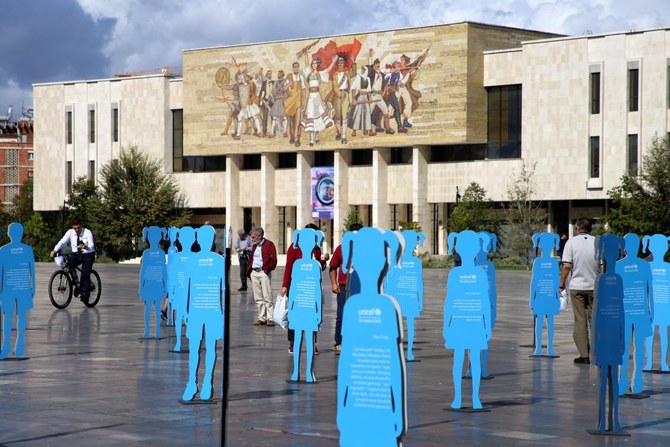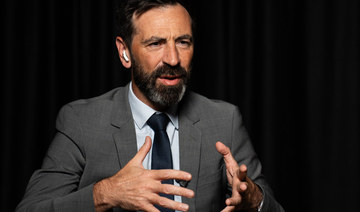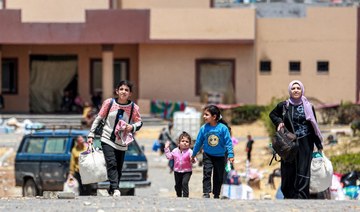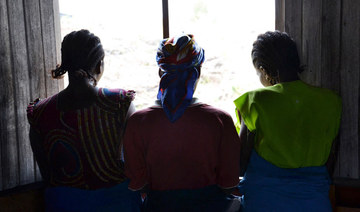WASHINGTON: The stranger-than-sitcom American presidency opened 2018 with a big tease about mutual nuclear destruction from two leaders who then found “love” not war. It seems President Donald Trump and North Korea’s Kim Jong Un were just playing hard to get.
The presidency ends the year saturated in tumult, with the government in partial shutdown and Trump tweeting a video of himself warbling a parody of the theme song from “Green Acres,” a television sitcom from the 1960s, to mark his signing of a farm bill.
Throw in a beer-loving and very angry Supreme Court nominee, an unhappy departing defense secretary, Trump’s parallel universe of facts and his zillion tweets, and you can see that the president’s world this year was touched by the weird, the traumatic and the fantastical — also known as WTF.
There was no holding back the self-described “very stable genius” with the “very, very large brain.”
Some serious and relatively conventional things got done in 2018.
There was a midterm election. Many more Democrats are coming to Congress and not quite all of them plan to run for president. Divided government dawns in January when Democrats take control of the House; Republicans retain their grip on the Senate.
An overhaul of the criminal justice system was accomplished, and in an unusually bipartisan way, though it took a dash of reality TV’s Kim Kardashian West to move it along. Gun control actually was tightened a bit, with Trump’s unilateral banning of bump stocks.
Trump shocked allies and lost Defense Secretary Jim Mattis over a presidential decision to pull US troops out of Syria, quickly following up with indications that up to half the troops in Afghanistan might be withdrawn, too.
Self-described “Tariff Man” started one trade war, with China, and headed off a second by tweaking the North American Free Trade Agreement and giving it an unpronounceable acronym, USMCA. He withdrew the US from the Iran nuclear deal, putting action behind his Twitter shout: “WE ARE NO LONGER A COUNTRY THAT WILL STAND FOR YOUR DEMENTED WORDS OF VIOLENCE & DEATH.”
Trump placed his second justice on the Supreme Court in two years after Brett Kavanaugh, accused of alcohol-fueled sexual assault in his youth, raged against the allegations at a congressional hearing and acknowledged only: “I liked beer, I still like beer,” but “I never sexually assaulted anyone.”
There were frustrations and fulminations aplenty for the president, particularly about the steaming-ahead Russia-Trump campaign investigation by special counsel Robert Mueller (“special councel” in some Trump tweets).
Nor did he make much progress on his promised border wall (“boarder wall“), which he renamed “artistically designed steel slats” in December in what he regarded as a concession to wall-despising, concrete-cursing Democrats. The concession did not work: large parts of the government closed Saturday over the wall-induced budget impasse.
He took heat for a zero-tolerance policy that forced migrant children from their parents until he backed off, inaccurately blaming Democrats for “Child Seperation.”
It was a very good year for jobs. It was a check-your-smartphone-right-now, pass-the-smelling-salts year for the stock market. Trump, who assailed the unemployment rate as a phony measure when he was a candidate, couldn’t speak of it enough as Obama-era job growth continued on his watch. He went mum about the market, a prime subject for his boasting before it took a sustained dive.
Trump’s approval rating in polls was one of the few constants on this swiftly tilting planet: 42 percent approval and 56 percent disapproval in The Associated Press-NORC’s latest and 38 percent-57 percent via Gallup, neither much different than in January.
Through it all, the mainstreaming of the bizarre proceeded apace and North Korea’s Kim set that tone right on Jan. 1 with his New Year cheer to Americans across the ocean: “It’s not a mere threat but a reality that I have a nuclear button on the desk in my office. All of the mainland United States is within the range of our nuclear strike.”
Trump responded the next day with a tweet about size and performance. “I too have a Nuclear Button, but it is a much bigger & more powerful one than his, and my Button works!“
Once they got that out of their system, things quickly improved, helped along by Kim’s letters to Trump, which the US president called “beautiful.” There was no more talk about Trump being a “mentally deranged dotard” or Kim being a “maniac,” the musty insults of an earlier time. In June, they held history’s first meeting between a North Korean leader and a current US president. “We fell in love,” Trump later said at a West Virginia rally.
Kim had previously vowed to visit “fire and fury” on the US but the “Fire and Fury” that made Trump livid early this year was the book of the same name, Michael Wolff’s insider account of the Trump White House. That was a different sort of missile. The president took particular exception to observations in the book by his former chief strategist, tweeting about “Sloppy Steve Bannon, who cried when he got fired and begged for his job. Now Sloppy Steve has been dumped like a dog by almost everyone. Too bad!“
They are said to be on better terms now.
Over the course of the year, Trump spoke at more than 40 campaign rallies, kept up his Twitter barrage (40,000 tweets since 2009 on his @realDonaldTrump account) and answered plenty of questions in infrequent but lengthy news conferences and sit-down interviews.
So what stands out in this blizzardy whiteout of unconventionality?
How about this farewell to his secretary of state, Rex Tillerson? “He was dumb as a rock and I couldn’t get rid of him fast enough. He was lazy as hell.” (The president usually reserves “dumb as a rock” for journalists.)
Or his description of Stormy Daniels, paid to stay quiet about their alleged affair, as “horseface?“
Or this description of his attorney general, Jeff Sessions, as “scared stiff and Missing in Action,” before Sessions was finally out in November?
Will history long remember that in 2018 the president called Democratic Rep. Adam Schiff “little Adam Schitt” on Twitter and nations in Africa “shithole countries” in a private meeting?
Or that he (correctly) predicted Hurricane Florence would be “tremendously wet” or told the AP: “I have a natural instinct for science?“
In July, Trump appeared to side with Russian President Vladimir Putin when he stood by Putin’s side at a Helsinki summit news conference and gave weight to Putin’s denial that Russia meddled in the 2016 election, despite the firm conclusion of US intelligence agencies that it had. “I don’t see any reason why it would be” Russia, Trump said.
But while it’s been hardly noticed in a capital consumed by the shutdown drama, Mattis, Syria, steel slats and market convulsions, 2018 draws to a close as it started — with warnings of a nuclear Armageddon, this time from Putin.
Putin’s prompt was Trump’s intention to walk away from one arms control treaty and his reluctance to extend another.
That, said Putin, “could lead to the destruction of civilization as a whole and maybe even our planet.”
Maybe he’s just playing hard to get.
North Korea, Kavanaugh, all those Trump tweets and more in 2018
North Korea, Kavanaugh, all those Trump tweets and more in 2018

- Over the course of the year, Trump spoke at more than 40 campaign rallies, kept up his Twitter barrage (40,000 tweets since 2009 on his @realDonaldTrump account) and answered plenty of questions
Vanity Fair France apologizes for removing Palestinian pin from image of Guy Pearce at Cannes

- Magazine faced backlash on social media for appeared attempt to censor pro-Palestinian solidarity
LONDON: Vanity Fair France was forced to issue an apology for digitally removing a Palestinian pin worn by actor Guy Pearce at the Cannes Film Festival.
On May 21, Vanity Fair published an article featuring several photographs of celebrities attending the festival. Among these was a portrait of Pearce wearing a black Yves Saint Laurent tuxedo.
Social media users quickly noticed that a pin of the Palestinian flag seen on his left lapel in other images had been removed.
Journalist Ahmed Hathout was one of the first to highlight the alteration, tweeting: “So Guy Pearce showed solidarity with Palestine at Cannes by wearing a pin and Vanity Fair decided to photoshop it out. Little did they know the bracelet was also of the Palestinian flag colors.”
The French subsidiary of the American magazine faced significant backlash on social media for what appeared to be an attempt to censor pro-Palestinian solidarity.
One user, @DarkSkyLady, tweeted: “Can we finally admit many of these outlets are propaganda-mouthpieces for colonialism and white supremacy?”
Another user, @Joey_Oey89, commented: “Reminder to unfollow and mute Vanity Fair. They smear celebs who take a stand against genocide and have made their stance clear.”
Responding to the criticism, Vanity Fair France posted an apology under Hathout’s tweet: “Good evening. We mistakenly published a modified version of this photo on the website. The original version was published on Instagram on the same day. We have rectified our error and apologize.”
The article on the magazine’s website now displays the unaltered image.
Pearce was among many celebrities at the prestigious festival who expressed solidarity with Palestine amid Israel’s brutal assault and seige on Gaza.
Other notable figures included actors Cate Blanchett and Pascale Kann, supermodel Bella Hadid, Indian actress Kani Kusrut, French actress Leila Bekhti, and Moroccan filmmaker Asmae El-Moudir.
Online anger following The Atlantic’s ‘possible to kill children legally’ in Gaza article

- The Atlantic’s writer Graeme Wood suggested that in certain scenarios killing of children can be legally justifiable
- Campaign group condemned the piece, calling the The Atlantic’s stance on the issue ‘egregious’
LONDON: The Atlantic has ignited a wave of online criticism after publishing an article arguing that “it is possible to kill children legally” in Gaza.
Titled “The UN’s Gaza Statistics Make No Sense,” the opinion piece by staff writer Graeme Wood questioned the accuracy of the UN’s civilian death toll numbers from the Israeli war on Gaza.
Wood suggested that the UN’s statistics were unreliable, claiming they are sourced from Hamas.
“The UN numbers changed because the UN has little idea how many children have been killed in Gaza, beyond ‘a lot.’ It gets its statistics from Hamas,” the piece read.
Wood, known for his skeptical stance toward Hamas and Palestine since the conflict erupted last October, controversially suggested that in certain scenarios, the killing of children can be legally justifiable.
Despite acknowledging that “even when conducted legally, war is ugly,” Wood argued, “It is possible to kill children legally, if for example one is being attacked by an enemy who hides behind them. But the sight of a legally killed child is no less disturbing than the sight of a murdered one,” he wrote.
The article sparked a significant online backlash, with the campaign group Writers Against the War on Gaza (WAWOG) condemning The Atlantic for the article.
“Eight months into the genocide and western media is still manufacturing consent for Zionism,” the group wrote in a post on X on Sunday.
“Defending child murder is egregious; but @TheAtlantic has historically defended imperial bloodshed,” WAWOG added.
@TheAtlantic published a justification for the murder of Palestinian children today. pic.twitter.com/CGTh3Aexxw
— Writers Against the War on Gaza (@wawog_now) May 26, 2024
Users took to social media to express their frustration over the article, with some questioning the legality of Wood’s claim and calling his choice of words “disgusting.”
“‘A legally killed child’ is a phrase I never imagined I would read in my lifetime,” wrote Lebanese political activist and musician Peter Daou on X.
"A legally killed child" is a phrase I never imagined I would read in my lifetime. https://t.co/8gPw9dAHF7
— Peter Daou (@peterdaou) May 26, 2024
Others have also called for canceling their subscriptions to The Atlantic.
The backlash comes as Israeli airstrikes killed at least 45 people on Sunday, hitting tents for displaced people in the southern Gaza city of Rafah, with reports that people were “burning alive.”
These attacks came two days after the International Court of Justice ordered Israel to end its military offensive in Rafah, described by the UNRWA as “horrifying.”
According to Gaza’s health ministry, the death toll in Gaza has neared 36,000 people, with the vast majority being children and women.
Bahrain’s youth rep taps into Kennedy with speech to Arab youth at Dubai media forum

- Youth ‘can craft a better future for us all,’ says Sheikh Nasser Bin Hamad Al-Khalifa
- Praises Gulf leaders ‘who are focused on the next generation rather than the next election’
DUBAI: Sheikh Nasser Bin Hamad Al-Khalifa, Bahrain’s representative for humanitarian work and youth affairs, delivered a sharply defined message to Arab youth and their custodians.
In a speech at the Arab Media Summit, Al-Khalifa echoed the words of former US President John F. Kennedy, saying: “For a better world and a prosperous country, one must ask themselves what I can do for my country rather than what can my country do for me.
“The youth, which make up over 60 percent of our citizens today, is very different than previous generations. They have become the driving force behind certain industries and have taken to adopting certain causes that will craft a better future for us all.
“They are engaged in political and civil societies more than ever before throughout history. They have even managed to become successful in sectors such as journalism, social media in forms of content, podcasts and also showing sharp wit in investments and trade.”
Al-Khalifa, who served in a military academy, said he carries the academy’s message of “in order to serve, you must lead” throughout his life and policies.
“While challenges can occur, as it did during the COVID pandemic, which affected not only economies but personal lives as well, it was a lesson to be learned. We came out of it, and we are at a better place now.
“Challenges are opportunities. Some folk lost a lot during the pandemic, while others progressed, and the difference between the two is that one seized the opportunity to create and further themselves. while others remained still.”
On the subject of open borders and one being a “global citizen,” Al-Khalifa urged the youth and their elders to continue to strive, travel, experience and learn, but to maintain a “moral direction that connects and centers you to who you are: an Arab.”
He added: “We are an Arab ummah, and what does that mean? It is a legacy, it is victories, accomplishments, values that we have carried and learned from our forefathers that we continue to build on today. To take on Western concepts such as ‘global citizen,’ one can be lost. Our identity is Arab first and foremost.
“Our religion, Islam, urged us to read, learn and engage. And that is what we do with other countries as we both compete and cooperate with them.
“Know who you are and where your roots lie. Some societies have become fragmented due to their abandonment of their values. Nowadays, we have Westerners who are enrolling their children in our schools to keep them centered and away from social and moral confusion.
“While it is valid and important to ride the new wave in terms of technology and progress of open borders to make our countries better, I urge fathers and mothers to continue to stress on an upbringing that focuses identity and positive moral values.
“We want to invest in our youth. It is important that they feel seen, valued, trusted and supported and wanted. If we do that, then their stock will never plummet. They are half of our present and all of our future.”
He concluded his speech by saying how blessed the Gulf is to have leaders “who are focused on the next generation rather than the next election,” and offered a prayer to the lives lost in Gaza.
Arab Media Forum opens in Dubai with focus on youth

DUBAI: The annual Arab Media Forum launched in Dubai on Monday for a three-day summit involving media leaders and executives from across the region.
This year’s forum is geared toward youth, focusing on arming the next generation of journalists and media professionals with the tools and know-how to thrive in the ever-growing industry in the Arab world.
For the past two decades, the forum has brought together regional and international speakers to discuss the industry’s challenges and impact on Arab societies.
More than 1,000 creative and media students are expected to attend, along with prominent Arab personalities, content creators and global media industry leaders taking part in a range of panel discussions and master classes.
Notable speakers include Sheikh Nasser bin Hamad Al-Khalifa, the king’s representative for humanitarian work and youth affairs in Bahrain; and Dr. Sultan Al-Neyadi, the UAE’s minister of state for youth affairs.
Monday’s schedule includes master classes on Meta, tools for storytelling, interactive media, as well as building personal brands.
Panels and discussions on the opening day cover sports media, the art of directing and redefining storytelling.
Tuesday and Wednesday will feature discussions on key political, economic and technological developments by media personalities, editors in chief, writers and experts from the region and around the world.
The forum will close with an awards ceremony recognizing content creators and journalists in a range of categories.
Over 300 million children a year face sexual abuse online: study

- One in eight of the world’s children have been victims of non-consensual taking, sharing and exposure to sexual images and video
- Grim trend on the rise with US worst offender, University of Edinburgh’s researchers says
LONDON: More than 300 million children a year are victims of online sexual exploitation and abuse, according to the first global estimate of the scale of the problem published on Monday.
Researchers at the University of Edinburgh found that one in eight of the world’s children have been victims of non-consensual taking, sharing and exposure to sexual images and video in the past 12 months.
That amounts to about 302 million young people, said the university’s Childlight Global Child Safety Institute, which carried out the study.
There have been a similar number of cases of solicitation, such as unwanted sexting and requests for sexual acts by adults and other youths, according to the report.
Offences range from so-called sextortion, where predators demand money from victims to keep images private, to the abuse of AI technology to create deepfake videos and pictures.
The problem is worldwide but the research suggests the United States is a particularly high-risk area, with one in nine men there admitting to online offending against children at some point.
“Child abuse material is so prevalent that files are on average reported to watchdog and policing organizations once every second,” said Childlight chief executive Paul Stanfield.
“This is a global health pandemic that has remained hidden for far too long. It occurs in every country, it’s growing exponentially, and it requires a global response,” he added.
The report comes after UK police warned last month about criminal gangs in West Africa and Southeast Asia targeting British teenagers in sextortion scams online.
Cases — particularly against teenage boys — are soaring worldwide, according to non-governmental organizations and police.
Britain’s National Crime Agency (NCA) issued an alert to hundreds of thousands of teachers telling them to be aware of the threat their pupils might face.
The scammers often pose as another young person, making contact on social media before moving to encrypted messaging apps and encouraging the victim to share intimate images.
They often make their blackmail demands within an hour of making contact and are motivated by extorting as much money as possible rather than sexual gratification, the NCA said.


















